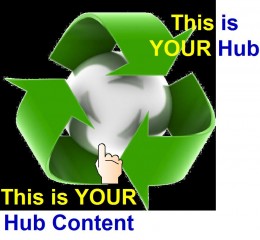When Recycling, Reducing, Reusing, how much are we TRULY helping to preserve our
When Recycling, Reducing, Reusing, how much are we TRULY helping to preserve our environment?
Do you think we are mislead by the consumer market to believe that by recycling our unwanted items or trash, "using hand blow-dryers" in public restrooms or by "going electronic" in all our daily affairs-as part of the Paper Reduction Act, that we are really "saving a tree, planting a tree, keeping our earth clean or preserving our wildlife"? How much control do "The People" really have over these aspects of living and survival?I'm not so sure that our generation will see a lot of difference in the environment because of the steps we are taking, but with the constant increase of human population, the conservation of our natural resources now, will effect those here in the future. However, no matter what we do, nature will always find a way.
I was just talking about this with my cousin last summer who is an environmental engineer. The topic came up because I was over his house for a BBQ. I noticed he was throwing away soda cans and not recycling. I asked him how he of all people wasn't recycling. He explained to me that a good portion of what the public recycles never actually gets recycled. He said it's not that recycling isn't good for the environment, but that the increased awareness for recycling has created more recycled material than the marketplace can use. In a sense we created more the supply in certain areas of the country with certain materials than we have demand for. To my surprise I found out that in our township there wasn't even a recycling agreement for the last several years, and the materials were just getting incinerated along with everything else because there was no organization that wanted it in large enough quantities. So in effect I have just been separating my garbage for the last few years for no reason. I would imagine the demand varies from material to material.
Additionally, I know there is also some debate about whether or not even more energy is used in the recycling process that could at times make the whole process counterproductive. I haven't read too much on that aspect of the topic."I am only one,
But still I am one.
I cannot do everything,
But I can do something;
And because I cannot do everything,
I will not refuse to do the something that I can do." Edward Everett HaleThis is a great question with many very complicated answers. Clearly, if we buy less, buy used items, and keep them in service longer, we are making a difference. Several years of study went to show that blow-dryers in bathrooms use less energy than paper towels. In other areas, it is very difficult to know. I've written eight hubs on Go Green, including Go Green: Is it for Real, or is it a Scam? and I've barely scratched the surface.
Government and business will always offer mixed motives and limited amounts of competence and reliability, as other answers here have shown. There is no "the people"; only 7 billion separate people. So, until we pull ourselves together, Billie Kelpin's wonderful quote from Everett Everett Hale is the best guidance and inspiration.Thank you so much for sharing this. Indeed complicated answers-let alone complicated subject at hand here. I do agree that we are "separate" amongst ourselves. We now live in a "self" world more now than ever, heading in different directions.
Yes, and there is a positive side to this individuation. We can each, for ourselves, decide what is true and work to make the world a better place by being the change we want to see in the world.
- Larry Wallposted 12 years ago
0
As a concept recycling is a great idea. We use to recycle soft drink bottles. Remember, if you are old enough, you took them back to the store. They were sent to the distributor to be washed, sanitized, etc. and used over again. The same was true for milk bottles. Then we went to the throw-away concept for convenience.
People recycle paper. If you are running high-volume copying machines, you do not want to use it. It can cause a malfunction--know from experience.
My city has curb side recycling. We put a lot out. I do not know how much is actually recycled.
There are disputes about recycling. You would think that cloth diapers would be better than disposable diapers. Last information I have, which is several years old, says that is not true, because the washing of the soiled diapers results in extra water being used and more phosphates being discharged.
The secret to recycling is to get the best use out of the resources we are using. However, they have to be practical and cost efficient. For years, there has been talk about capturing methane from garbage dumps. As a rule, the amount of methane that is captured, does not cover the cost of capturing it.
We use to drink water from a glass that was filled at the kitchen sink. Now we drink bottled water, which in many cases is no better than your commercial water supply.
So we have two steps to take. First, we have to make sure that every resource we use is used to the fullest extent possible.
The second step is to find a method for disposing of the waste material without damaging the environment through harmful emissions or water discharges.
Thirdly, our lawmakers have to learn to pass laws that are based on good science and not because they word "environment" is somewhere in the title of the proposed law or regulation. We are legion, for we are many.
Who cares how much you are TRULY helping. You should just care that you ARE helping more than you would be if you didn't do these things.A lot more than most people realize. The main environmental benefits are reducing the procurement of new feedstocks and vastly reducing the energy needed to make finished goods. I did a hub about recycling, and was surprised by just how much energy is saved when goods are made from recycled feedstocks. It varies based on the materials, but for most it's well over 50% energy reduction. Since a lot of energy is still produced in environmentally unfriendly ways, reducing energy useage has a big positive environmental impact.
When all of the manufacturers that make plastic bottles, plastic bags, paper, glass etc, shut down, then we will know the Earth is greener. Until then they are still cutting down trees and doing whatever it is they do to make plastic and glass. I think it is a marketing ploy to sell new "green" products.
When we recycle milk, water, and soda bottles, we keep them off the street curbs, and parks, and that equals a clean street and park. I live in the Middle Georgia area, and we recycle. I hardly see litter on the streets as compared to when I lived in the New York area.
A drop here, and a drop there, and pretty soon it'll make a river, or maybe even an ocean.
Every little bit count.Local clean is good. But too often, a clean neighborhood is filling a dirty landfill.
Sid, I agree. Many environmental issues aimed at solving one problem, may create another that was not anticipated. Our new energy efficient light bulbs with mercury inside of them is one example. Less electricity use, bigger disposal problem created.
Yes, Larry, and a new solution follows. There are now even lower-energy LED light bulbs - no mercury, less electricity, fit into old sockets, and, in my opinion, better quality light.
Makes sense, there is always room for improvement. Gasoline has less emissions than it did five, 10 and 20 years ago--there are always better ways--just takes time, effort and money to find most of them.
You're right. But when it's well organized, the trash are just recycled and used for something else, like the park benches made of recycled plastic and wood refuse. We have Coca Cola right here. They do a good just recycling & reusing the refuse.
It's a truly complex question with no one size fits all answer.
To take just one aspect of it, I was a tree feller in an earlier life, din't earn a fortune but got by with the satisfaction of leaving healthy and well managed plantations.
Paper recycling took off with the result that demand (and therefore price) of pulp wood fell dramatically and with it the very basic pay for fellers became inadequate.
Now we see a lot of neglected and overgrown plantations!
Like I said, it isn't simple.Those that want to end the use of oil based products would put many people out of work and deprive the nation of revenue. No one has come up with an alternative that can do the things oil can. Pause for oil spill joke. "You can't spill sunshine."
Not true. People have come up with alternatives for plenty of things that oil can do.
Very little impact I'm afraid. When we consider the pollution that all these electronic devices generate in their manufacture. Far from saving the trees it is probably choking the life out of them.
The idea of the paperless office is at least 40 years old. Yet we are printing more newspapers, magazines and other junk than ever before in the history of mankind.
What can the 'people' do. Plenty.
Stop buying all this waste and then worrying about recycling it. STOP BUYING IT.
Great question.Have you ever seen a paperless office? No I haven't either!
Based on the experience in my old office, I would say that the Internet has increased the amount of paper in the office. We had a guy who scanned a bunch of articles and then printed them out each day instead of reading them on the screen.
It is a complicated issue. There are always tradeoffs. Increase use of public transport may benefit the environment but does wonders in spreading flu. Great if you are virus. Increased use of electricity may be balanced by the environmental cost of making digital goods and there is a mountain of obsolete computer parts that can only be recycled at a loss (until someone invents a cheaper less polluting way to extract the valuable materials).
In general Reuse, Repurpose, make something else out of it makes sense as a strategy. It means the environmental cost is spread over a longer period of time.
Think of a used object as potentially something else or that could be made into a work of art.
But as to hand dryers, the logical thing to do would be to install Bidets in public toilets.If more people used public transport then more people would have resistance to germs and viruses. I do however agree that the longer you can put off recycling something the better it is for the environment. I wrote a hub on ways of reusing newspaper
John, The problem is flu mutates as people develop immunity.
No, it just mutates, no connection to peoples immunity. BTW I had flu when I was about fourteen, it nearly killed me. I've never had flu since. Most of what is called flu these days is no more than the common cold
Also, you still need cars to go to the grocery store, soccer practice, church. We can reduce gasoline use--but I think we will find ways to use what we save.
Electric cars, hydrogen cars, steam cars(!) Bicycles. My ancestors used to walk four miles to church, and four miles home again - twice a day!
- tsmogposted 12 years ago
0

An interesting question. A reasonable discussion could be had. Sweden 'buy's 800,000 tons of trash a year. Their recycling program is effective and efficient enough to provide near to 'Free' power for 250,000 of their citizens.
A contrast is they recycle only 4% becoming landfill refuse in comparison to the US being 34%. Food for thought.Another thought to look into is Finland and their Solar Energy project seeking to make that country self sufficient and not dependent of fossil fuels for power. They are years ahead of their original planning schedule
Here is link to a buzz60 video. http://youtu.be/I9Z4eKdHPTQ
It may be we are bigger and less organized, however whose responsibility is the future. The federal government, state government, communal cities and societies, groups, families, and finally the individual. Sweden's success may contrast some views, yet it is progressive and creates power which today equates to money. This depends on how many people are doing this IMHO. But bottom line it have to start with someone, as long as you feel good about it and doing it because you want to make a difference (make your life better) not because someone is forcing you to do it (you will always find ways to fight back) then that is one step closer in preserving environment.
This is what I can say living in a province where there are a lot of tree the air seems fresher than when I go to the city.
Well, for me I do believe that "a small effort can give big difference" and remember everything comes from little things. So,by effort of most, excellent output would be expected.
Every little bit helps and is not that much of a struggle to do it.
If many people aware that recycling, reducing, reusing, helps to preserve the environment it means a lot and will make a great impact to our Earth.
The more the better. Of the 3 towns here, none were recycling. Now one started recycling it. A journey of a thousand miles, begins with one step. It is just like exercise. One minute of exercise a day is better than no exercise. But 2 minutes of exercise is twice as good as one minute. But 5 minutes of exercise is 5 times as good as one minute a day and a thousand times better than no exercise.
In China they now have all these cars instead of bicycles. In Dubai there is plenty of oil, but they just created the largest solar electric plant in the world.
Here is another way to look at it. If you start murdering people every week how much effect will you have on the murder rate in the country? Virtually no effect. But it will affect you. So you should do what you can by not murdering anyone and doing your best to recycle. There is no recycling in our town but my friend goes to the post office and recycles all the junk mail thrown away.- Vickiwposted 12 years ago
0
I do recycle, and I hope that it is actually recycled! We do have a very active recycling centre here. As I think about it though, Singapore does not recycle, and that would negate what we do many times over. I really don't know what I can offer to this question, as it seems we would have to have data from all countries to know.
Very interesting question though, and worth lots of discussion. I have no measurable idea, if all of the junk mail, that I received last month, equals a branch...................certainly, not a whole tree.......................
I have no measureable, global impact..............
This, I do know.............I can shred that paper and use it for filler, blanket, cover for my young plants in the garden...............
This , is what I know..............I will do the small part that I can..........to do what I can...................If millions or tens or millions, will so some small thing...........it will add up to a great thing.,
"using hand blow-dryers" in public restrooms PS...................YES, I have brushed my teeth, washed my face, shampooed my hair in a public rest area...........................it is what truck drivers have to do........while bringing you.........the products of your needs and luxury.I wonder the same thing sometimes. For all the recycling that we do, why do we not see a reduction in waste? The dumpsters are still filled to bursting at the stores and our homes. And there are things that we cannot recycle that are now circulating our globe that didn't before. For example, the caps off all of those plastic and glass bottles? What are we supposed to do with those? They now float down the rivers, into the oceans, being eaten by birds and fish and aquatic life along the way. This wasn't so much of a problem before as they were attached to that bottle we threw away. Sure it sat in a landfill or floated in the water, but it wasn't really killing anything at that point, it just looked gross. Now those caps are killing animals, so how did all that recycling really help? It just has a different trickle effect down the line.
Good question, and one that has severely limited the effects of utilizing the 3 R's. The actual effect you have on the environment is extremely minimal either helping it or making it worse. It's the magnification of this effect by the amount of participants. If your entire household recycles, reduces, and reuses, you could very easily save a dozen or so trees a year, save up to 1 maybe 2 tons of garbage being put into a landfill, stuff like that. It's all EVERYONE doing their part, because the mentality similair to that of voting, has been destroying the environment for years. You yourself may not make a difference but if everyone thought that way, the world would be in a much worse place than it already is.
Related Discussions
- 10
Why are they not recycling?
by Debra Allen 10 years ago
Why are they not recycling?I was just watching a show on DFH called Hording Buried Alive and he had hoarded lots of stuff, mostly trash it shocked me. We all talk about the plight of the earth that we are all causing the demise of the planet with our trash. I liked the they got rid of many things...
- 53
Does recycling really make a difference or just make you feel better?
by Rambler1 13 years ago
I have often wondered this since recycling is so reported in the world as being important. Since visiting the local recycling drop off it seems few people actually recycle.
- 7
Should we recycle?
by Luke M. Simmons 10 years ago
Should we recycle?This question should be broken down into two seperate points. First, what are the environmental impacts of recycling? Do we use more energy to produce new materials from scratch, or recycle existing materials? What are other factors that impact the environment? How do these...
- 9
Do you recycle?
by HannahRiley 10 years ago
Do you recycle?
- 7
Why are some people so resistant to reducing waste? (ie. recycling, compost, etc
by Katelyn Weel 14 years ago
Why are some people so resistant to reducing waste? (ie. recycling, compost, etc.)
- 35
Have your ever "recycled" your romantic relationships?
by kallini2010 12 years ago
Have your ever "recycled" your romantic relationships?Recycling means - you have dated him/her before, split up, then met up and started dating again. Why, why not and what do you think about "recycling"?


























